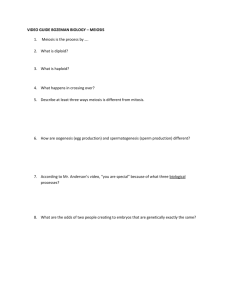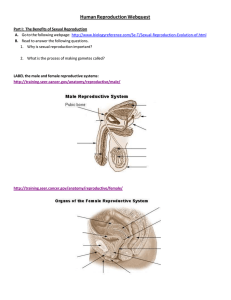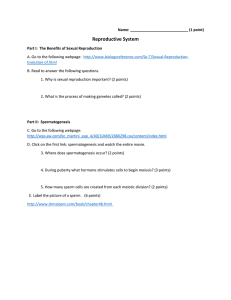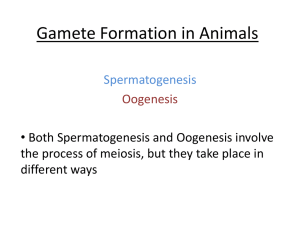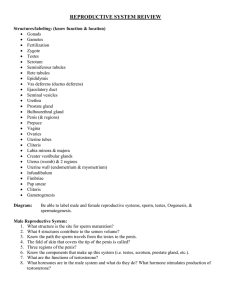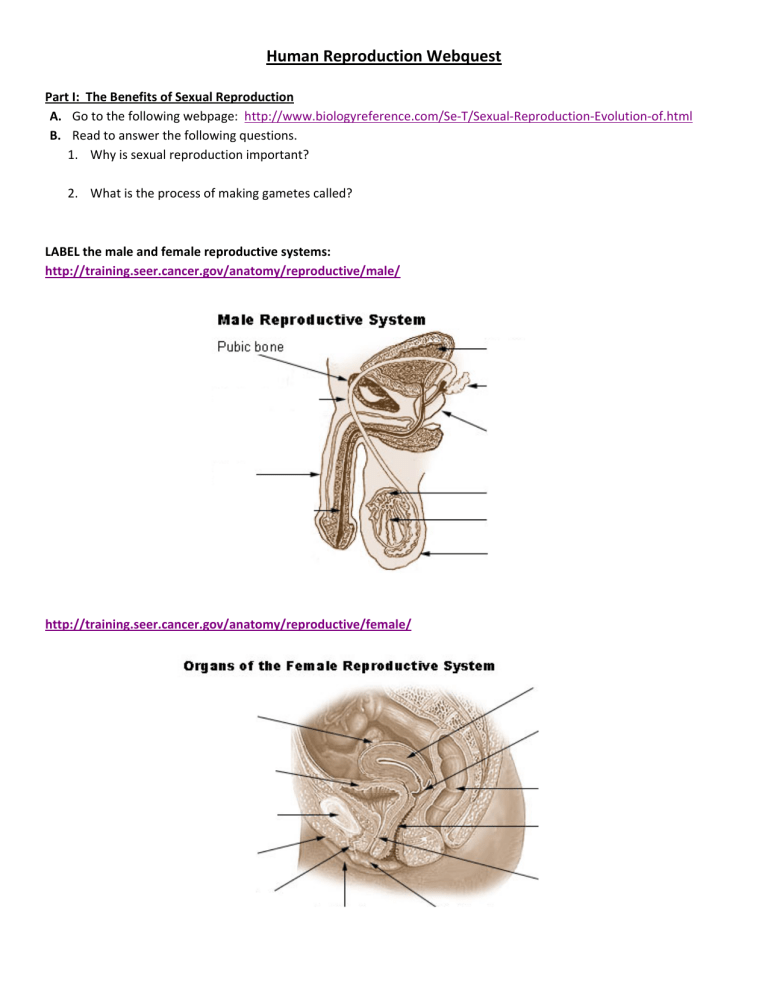
Human Reproduction Webquest Part I: The Benefits of Sexual Reproduction A. Go to the following webpage: http://www.biologyreference.com/Se‐T/Sexual‐Reproduction‐Evolution‐of.html B. Read to answer the following questions. 1. Why is sexual reproduction important? 2. What is the process of making gametes called? LABEL the male and female reproductive systems: http://training.seer.cancer.gov/anatomy/reproductive/male/ http://training.seer.cancer.gov/anatomy/reproductive/female/ Part II: Spermatogenesis C. Go to the following webpage: http://wps.aw.com/bc_martini_eap_4/40/10469/2680298.cw/content/index.html D. Click on the first link: spermatogenesis and watch the entire movie. 3. Where does spermatogenesis occur? 4. During puberty what hormone stimulates cells to begin meiosis? 5. How many sperm cells are created from each meiotic division? E. Open another window and type in the following URL: http://highered.mcgraw‐hill.com/olc/dl/120112/anim0043.swf F. Watch the animation. Draw the process of spermatogenesis. Use the image and word bank below to help you! Spermatgonia Mitosis Meiosis I Meiosis II Primary Spermatocyte Secondary Spermatocytes Spermatids Differentiation Sperm Cell G. Complete the following questions / matching section. Continue to watch the animation as needed so that you can do this. 6. Are spermatogonia diploid or haploid cells? 7. After the first division, mitosis, one cell remains a spermatogonia while the other continues on to form sperm. Why do you think it might be important to have one cell remain as a spermatogonia? 8. How many chromosomes are in a sperm? 9. What is differentiation? H. Label the picture of a sperm to the right. http://www.drmalpani.com/book/chapter4b.html I. Outline the role of hormones in spermatogenesis. http://training.seer.cancer.gov/anatomy/reproductive/male/response.html 1. LH 2. FSH 3. testosterone J. Role of the following in semen production http://training.seer.cancer.gov/anatomy/reproductive/male/glands.html 1. Seminal vesicle 2. Prostate gland http://training.seer.cancer.gov/anatomy/reproductive/male/duct.html 3. epididymis Part III: Oogenesis K. Return to the first webpage: http://wps.aw.com/bc_martini_eap_4/40/10469/2680298.cw/content/index.html L. Click on the second link: reproductive system of the human female and watch the FIRST of the SEVEN tutorials 10. What are the four main parts of the female reproductive system? 11. Of these 4, which one is responsible for making the eggs? 12. Of these 4, which one do you think is most commonly referred to as the fallopian tubes? 13. Of these 4, which one is the sight of fertilization (where the egg and the sperm unite)? 14. Of these 4, which one is responsible for housing the baby while he/she matures? M. Return to the first webpage: http://wps.aw.com/bc_martini_eap_4/40/10469/2680298.cw/content/index.html N. Click on the third link: oogenesis and watch the animation (sound ON) 15. Where does oogenesis occur in females? 16. Mitosis and meiosis I begin BEFORE birth in females and then stops until what time in a female’s life? 17. The video states that each woman has a finite number of primary oocytes at birth. What does that mean? 18. When females perform meiosis I the cytoplasm of the cells is not divided equally. As a result the primary oocyte creates a secondary oocyte and a . 19. The secondary oocyte then enters the oviduct (fallopian tube) and begins meiosis II. The process of meiosis II will not finish, though, unless what occurs? 20. How many actual ova (eggs) are created in one meiotic division? 21. Label the diagram of the egg/ovum http://medical‐dictionary.thefreedictionary.com/Human+egg Part IV: Comparing Spermatogenesis and Oogenesis O. Return to the first webpage: http://wps.aw.com/bc_martini_eap_4/40/10469/2680298.cw/content/index.html P. Click on the fourth link: comparison of spermatogeneis and oogenesis and watch the animation. Q. Copy the timelines (see below) and fill in: (1) when mitosis begins, (2) when mitosis ends, (3) when meiosis begins, (4) when meiosis ends Spermatogenesis Timeline Embryo Birth Childhood Puberty Childhood Puberty Death Oogenesis Timeline Embryo Birth Menopause Death Part V: Fertilization R. Watch http://www.dnatube.com/video/2911/Fertilization‐animation Go to the following webpage: http://www.ncbi.nlm.nih.gov/books/NBK26843/ Describe the process of fertilization include the acrosome reaction, penetration of the egg membrane, and cortical reaction. S. Go to the following webpage: http://www.devbio.biology.gatech.edu/?page_id=519 Use the information and picture below to help you put the statements in the correct order. A B C D E F G The sperms acrosome opens and the enzymes eat away at the egg The cell membranes of the sperm and egg fuse The sperm approaches the egg A fertilization envelop forms, blocking out additional sperm Proteins on the sperm bind with proteins on the egg The sperms nucleus enters the egg The nuclei of the sperm and egg fuse, creating the zygote PART VI: Ovary: Annotate the diagram: http://www.mhhe.com/socscience/sex/common/ibank/ibank/0011.jpg PART VII: Menstrual cycle: Hormone Role: http://www.britannica.com/EBchecked/topic/375300/menstruation/75986/Hormonal‐control‐of‐menstrual‐cycle 22. FSH (follicle stimulating hormone): 23. LH (luteinizing hormone): 24. Estrogen: 25. Progesterone: Graphing the cycle: hormones, ovulation, menstruation, endometrium http://catalog.nucleusinc.com/generateexhibit.php?ID=10405 Draw a graph of the menstrual cycle, include all hormones, endometrium changes, and follicle development. Then ANNOTATE the graph to explain the changes. PART VIII: Pregnancy, Development, and Birth: 1. What is the role of HCG in early pregnancy? http://www.rnceus.com/hormone/hcg.html 2. Outline the development of the embryo from fertilization to implantation. http://fullmoonsdaughter.com/blog/2009/11/pregnancy‐timeline‐conception‐through‐first‐2‐weeks/ http://www.med.umich.edu/lrc/coursepages/m1/embryology/embryo/06placenta.htm 3. What materials are passed between the mother and the fetal blood? 4. Does the mother and fetal blood mix? Explain 5. What is the role of the amniotic fluid during fetal development? 6. Outline the placental structure and function. http://www.vivo.colostate.edu/hbooks/pathphys/reprod/placenta/endocrine.html 7. What role does the placenta have on the secretion of estrogen and progesterone? 8. Explain the role of the following hormones on maintaining pregnancy: Estrogen: Progesterone: http://www.emc.maricopa.edu/faculty/farabee/biobk/biobookreprod.html#Birth 8. Outline the process of birth. http://click4biology.info/c4b/11/hum11.4.htm#15 9. Discuss the changes in hormones associated with birth. Progesterone: Oxytocin: http://www.pennmedicine.org/health_info/body_guide/reftext/html/endo_sys_fin.html 10. Diagram the positive feedback of oxytocin. PART IX: In vitro Fertilization: 1. Outline the stages of IVF: http://www.abc.net.au/science/lcs/ivf.htm 2. Read the two “articles” and discuss the value of each with relation to ethical issues of IVF. http://brendakaren.wordpress.com/2009/04/15/some‐moral‐and‐ethical‐issues‐concerning‐ivf‐techniques/ http://pedsinreview.aappublications.org/content/20/8/e28.full 3. List 5 positive or negative issues concerning IVF. http://click4biology.info/c4b/6/hum6.6.htm#six
